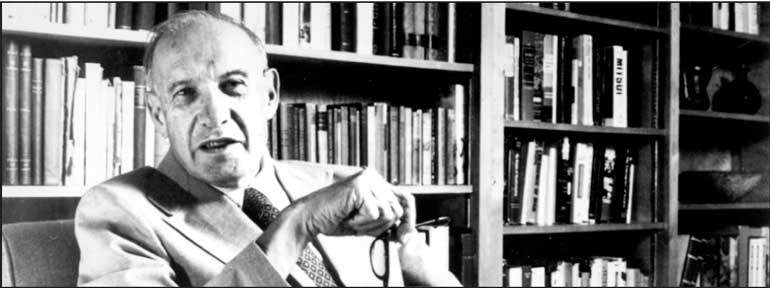Wednesday Feb 18, 2026
Wednesday Feb 18, 2026
Wednesday, 26 November 2025 00:18 - - {{hitsCtrl.values.hits}}

Peter Drucker
 Is Drucker applicable in the Digital age? Many raise this question about the most admired management thinker of our times. It is pertinent time to answer as we commemorate his twentieth death remembrance. He was born and died in November. To be precise, born on 19 November 1909, and died on 11 November 2005, his thoughts on being brilliant on basics of management have influenced millions. Today’s column reflects his relevance in modern days and times.
Is Drucker applicable in the Digital age? Many raise this question about the most admired management thinker of our times. It is pertinent time to answer as we commemorate his twentieth death remembrance. He was born and died in November. To be precise, born on 19 November 1909, and died on 11 November 2005, his thoughts on being brilliant on basics of management have influenced millions. Today’s column reflects his relevance in modern days and times.
Overview
“There are no good or bad institutions but well-managed or ill-managed institutions.” The visionary statement by Drucker is applicable not only to institutions but to countries as well. We have seen that around the globe rise and fall of great nations based on the quality of their leadership. “My greatest strength as a consultant is to be ignorant and ask a few questions.” I remember this powerful quote from him, every time I engage in a challenging consultancy. He has been a guiding light for me as a life-long learner.
“Management by objective works - if you know the objectives. Ninety percent of the time you do not.” I have seen the ironic reality of this brilliant quote from him when we set objectives without communicating them properly and promptly to those who are supposed to execute, paving the way for many blame games.
Drucker and digital era
"Technology is not about tools, it deals with how Man works,” said Drucker. He highlighted that technology's true impact is on human work and processes, not just the tools themselves. In today’s large-scale digitisation efforts, we see again that deeply human drive to forge ahead with new tools and ideas that are appealing. The best-led organisations are managing to strike a healthy balance between continuity and change. Harnessing technology in ways that respect the wisdom and energy that reside only in people, they are reasserting the human imperative.
“We now accept the fact that learning is a lifelong process of keeping abreast of change; and the most pressing task is to teach people how to learn,” opined Drucker. His view on knowledge workers as the 21st century's most valuable asset is very much relevant to the digital age. He argued for “human augmentation,” not just automation, in using technology to enhance human capabilities rather than replacing them entirely.
His key words on technology are visionary. “ In a few hundred years, when the history of our time will be written from a long-term perspective, it is likely that the most important event historians will see is not technology, not the Internet, not e-commerce. It is an unprecedented change in the human condition. For the first time - literally - substantial and rapidly growing numbers of people have choices. For the first time, they will have to manage themselves. And society is totally unprepared for it.”
Drucker the professional
BusinessWeek called Drucker as the man who invented management. His contribution was so vital. He was a professional on many fronts. He shined as a thinker, teacher, and a trailblazer. “Efficiency is doing things right; effectiveness is doing the right things” is perhaps the best yet so simple quote from him.
From 1950 to 1971, Drucker was a professor of management at the Graduate Business School of New York University. He was awarded the Presidential Citation, the university's highest honor. Drucker came to California in 1971, where he was instrumental in the development of one of the country's first executive MBA programs for working professionals at Claremont Graduate University (then known as Claremont Graduate School). The university's management school was named the Peter F. Drucker Graduate School of Management in his honor in 1987. He taught his last class at the school in the spring of 2002. His courses consistently attracted the largest number of students of any class offered by the university.
Drucker had long wished to have the name of a benefactor attached to the school that bore his name. His wish was fulfilled in January of 2004, when the name of his friend, Japanese businessman Masatoshi Ito, was added to the school. It is now known as the Peter F. Drucker and Masatoshi Ito Graduate School of Management. As Drucker said, "it deals with people, their values, their growth and development, social structure, the community and even with spiritual concerns… the nature of humankind, good and evil." His holistic approach towards management development was very evident.
Drucker’s contribution
Drucker's work had a major influence on modern organisations and their management over the past 60 years. Valued for keen insight and the ability to convey his ideas in popular language, Drucker often set the agenda in management thinking. Central to his philosophy is the view that people are an organisation's most valuable resource, and that a manager's job is to prepare and free people to perform.
Drucker's ideas have been disseminated in his 39 books, which have been translated into more than 30 languages. His works range from 1939's "The End of the Economic Man" to "Managing in the Next Society" and "A Functioning Society," both published in 2002 and "The Daily Drucker," released in 2004. His last book co-authored with Joseph A. Maciariello, "The Effective Executive in Action" was published by Harper Collins in January of 2006.
Drucker created eight series of educational movies based on his management books and 10 online courses on management and business strategy. He was a frequent contributor to magazines and a columnist for the Wall Street Journal from 1975 to 1995. A highly sought-after consultant, Drucker specialised in strategy and policy for both businesses and non-for-profit organisations. He worked with many of the world's largest corporations, with small entrepreneurial companies, with nonprofits and with government agencies.
“Checking the results of a decision against its expectations shows executives what their strengths are, where they need to improve, and where they lack knowledge or information.” Such was the advice from Drucker for the executives.
Accolades for Drucker
Drucker was awarded the Presidential Medal of Freedom in July 2002 by President George W. Bush in recognition for his work in the field of management. He received honorary doctorates from universities in the United States, Belgium, Czechoslovakia, Great Britain, Japan, Spain, and Switzerland.
Let others now speak for Drucker. Given below are some.
"The world knows he was the greatest management thinker of the last century," Jack Welch, former chairman of General Electric Co. (GE ), said after Drucker's death.
"He was the creator and inventor of modern management," said management guru Tom Peters. "In the early 1950s, nobody had a tool kit to manage these incredibly complex organisations that had gone out of control. Drucker was the first person to give us a handbook for that."
Adds Intel Corp. (INTC ) co-founder Andrew S. Grove: "Like many philosophers, he spoke in plain language that resonated with ordinary managers. Consequently, simple statements from him have influenced untold numbers of daily actions; they did mine over decades."
"It is frustratingly difficult to cite a significant modern management concept that was not first articulated, if not invented, by Drucker," says James O'Toole, the management author, and University of Southern California professor. "I say that with both awe and dismay." In the course of his long career, Drucker consulted the most celebrated CEOs of his era, from Alfred P. Sloan Jr. of General Motors Corp. (GM ) to Grove of Intel.
Deep into Drucker’s writings
BusinessWeek magazine in its special supplement after Drucker’s death highlighted his noteworthy achievements.
Drucker made observations of his life's work, gleaning deceptively simple ideas that often elicited startling results. Shortly after Welch became CEO of General Electric in 1981, for example, he sat down with Drucker at the company's New York headquarters. Drucker posed two questions that arguably changed the course of Welch's tenure: "If you weren't already in a business, would you enter it today?" he asked. "And if the answer is no, what are you going to do about it?"
Those questions led Welch to his first big transformative idea: that every business under the GE umbrella had to be either No. 1 or No. 2 in its class. If not, Welch decreed that the business would have to be fixed, sold, or closed. It was the core strategy that helped Welch remake GE into one of the most successful American corporations of the past 25 years.
Way forward
Drumming Drucker in the digital age requires appropriate adaptation of his wisdom to a world in turbulence. Technology can be a versatile tool but a volatile master. In Drucker’s own words, “follow effective action with quiet reflection; from the quiet reflection will come even more effective action.” Doing so will add value to most of our lives, enriching institutions, and nations alike.
(The author, a Senior Professor in Management, and an Independent Non-Executive Director, can be reached at [email protected], [email protected] or www.ajantha dharmasiri.info.)